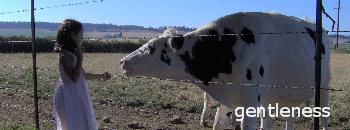One of the hardest aspects of teaching to deal with is watching young people self-sabotage and self-destruct. It's impossible to remember just how many people I've seen fail courses simply because they didn't want to do the work necessary to learn the material they were assigned to learn. A grade is simply an indication of how much a student has learned--or at least, it should be--and a failing grade tends to indicate that the student hasn't learned much at all.
If I'm teaching Spanish, for example, the students' grades indicate whether or not the students have reached the level of the language that they're assigned to reach. If a student reaches the end of the second year and still can't answer the question "How are you?", then of course there's a significant problem, and giving the student a passing grade is definitely the worst thing that I could do. That passing grade is saying not only that the student has met the requirements of the course (they haven't), but also that the student is ready for the next Spanish course in the sequence (they're not).
Unfortunately, though, I see a lot of teachers making it possible for students to earn a passing grade in their classes without knowing what they're supposed to know or doing the work they're supposed to do. I can't tell you the number of teachers I've seen who really do nothing but assign students to work on packets as a group, and then the teacher sits at his or her computer for the next hour, answering the odd question or two. In the meantime, not all the students are doing the work--many members of groups are allowing one person to come up with all the answers, and then they're simply copying those answers on their own worksheets and turning them in. And getting the same grade as the students who did the work.
I see this in the students' attitudes towards learning. Much of the time when I'm working with a class and someone raises their hand for help, all they want is for me to come over and give them an answer. They get upset with me when I come over and refuse to answer the question for them--instead, I point out in the text where they can find the answer themselves. Most of them don't like that one bit. But I don't care. If I'm going to be entrusted with my students' learning, then I'm going to do all I can to help them to learn, and to help them to learn how to learn.
But learning takes effort, and it's much easier to just have someone give you the answer. After all, these young people have grown up being able to put any question they want into a search engine and get an immediate answer with no effort at all. They can visit a translation site online and get immediate translations for anything they want to say--though the translations are often quite inaccurate. They're not used to having to work to get an answer for anything, and teachers don't help a bit when they make their classes nothing more than an effort to find the right answer to questions. Life is about processes and cycles and depth, while our learning has become shallow and superficial. We can't learn about the nuances of life until we learn how to learn, until we're able to see a lesson and take from it what it has to teach us.
Some young people are lucky. They have parents who don't allow them to spend all of their free time on their phones, who expect their kids to read and to do work that helps them to learn and grow. Of course, many of those kids see their parents as ridiculously out of touch with reality, and extremely unfair. They don't understand now what they'll know for sure some years from now: that their parents' refusal to allow their kids to do something just because "everyone else is doing it" is actually the best thing that they can do for their children in the long run.
How often are we willing to make the effort to do something well? We used to cook for hours and have meals that were truly worth the time and effort. We used to sit down and write letters by hand, and we came up with some very nice letters, the likes of which we don't see much any more. All in all, our current tendencies to do things as quickly and easily as possible aren't helping us to grow and develop as human beings, as unique individuals, and they're not helping us to develop our unique skills and talents, either.
How often have I wished that someone who works at a store had taken a bit of extra time to actually learn their job and learn their store? How often have I wished that a server had learned more about the food and beverages that they were serving? Over the years I have had some situations in which I've ended up with serious problems because someone else didn't take the time or make the effort to learn their jobs better.
We have control over much of our lives, and much of that control lies in the decisions that we make to better ourselves, to learn and to grow and to develop. What kinds of decisions will you make? Will you take the easy course all the time, or will you challenge yourself now and then to do something better than you've done it before? When we talk about living life fully, it seems pretty obvious that the full life isn't the easy and empty life, but rather the life that has been spent developing quality and getting better at the things we love to do.
My mentor taught me that success is a numbers game and very early he started asking me my numbers. He asked, "How many books have you read in the last ninety days?" I said, "Zero"; he said, "Not a good number." He said, "How many classes have you attended in the last six months to improve your skills?" And I said, "Zero." He said, "Not a good number." Then he said, "In the last six years that you've been working, how much money have you saved and invested?" I said, "Zero" and he said, "Not a good number." Then here's what he said, "Mr. Rohn, if these numbers don't change your life won't change. But," he said, "If you'll start improving these numbers then perhaps you'll start to see everything change for you." -Jim Rohn









